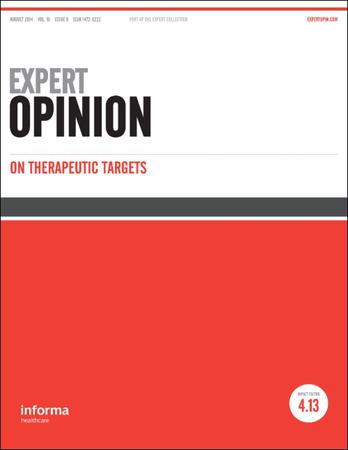目前针对癌症 HPK1 的策略以及临床前研究进展的障碍。
IF 4.6
2区 医学
Q1 PHARMACOLOGY & PHARMACY
引用次数: 0
摘要
简介造血祖细胞激酶 1(HPK1)是一种 97 kDa 的丝氨酸/苏氨酸 Ste20 相关蛋白激酶,主要在造血系细胞中作为细胞内负调控因子起作用,对 T 细胞、B 细胞、树突状细胞和其他免疫细胞进行调控。失去 HPK1 激酶活性会导致细胞因子分泌加剧、T 细胞信号传导增强、病毒清除率提高,从而抑制肿瘤生长。本综述通过检索PubMed、Espacenet-专利检索和clinicaltrials.gov,全面分析了HPK1,包括其结构和在各种下游信号通路中的作用、HPK1组成性激活的后果以及治疗HPK1驱动的恶性肿瘤的潜在治疗策略。为了提高肿瘤免疫疗法在临床试验中的成功率,开发基于 HPK1 晶体结构的蛋白降解剂、异位抑制剂和抗体-药物共轭物以及探索联合治疗方法非常重要。尽管HPK1抑制剂的开发仍面临一些挑战,但在临床前和临床研究中显示出良好的前景。本文章由计算机程序翻译,如有差异,请以英文原文为准。
Current strategies for targeting HPK1 in cancer and the barriers to preclinical progress.
INTRODUCTION
Hematopoietic progenitor kinase 1 (HPK1), a 97-kDa serine/threonine Ste20-related protein kinase, functions as an intracellular negative regulator, primarily in hematopoietic lineage cells, where it regulates T cells, B cells, dendritic cells and other immune cells. Loss of HPK1 kinase activity results in exacerbated cytokine secretion, enhanced T cell signaling, improved viral clearance, and thus increased restraint of tumor growth. These findings highlight HPK1 as a promising target for immuno-oncology treatments, culminating in the advancement of candidate compounds targeting HPK1 to clinical trials by several biotech enterprises.
AREAS COVERED
Through searching PubMed, Espacenet-patent search, and clinicaltrials.gov, this review provides a comprehensive analysis of HPK1, encompassing its structure and roles in various downstream signaling pathways, the consequences of constitutive activation of HPK1, and potential therapeutic strategies to treat HPK1-driven malignancies. Moreover, the review outlines the patents issued for small molecule inhibitors and clinical investigations of HPK1.
EXPERT OPINION
To enhance the success of tumor immunotherapy in clinical trials, it is important to develop protein degraders, allosteric inhibitors, and antibody-drug conjugates based on the crystal structure of HPK1, and to explore combination therapy approaches. Although several challenges remain, development of HPK1 inhibitors display promising in preclinical and clinical studies.
求助全文
通过发布文献求助,成功后即可免费获取论文全文。
去求助
来源期刊
CiteScore
8.90
自引率
1.70%
发文量
58
审稿时长
3 months
期刊介绍:
The journal evaluates molecules, signalling pathways, receptors and other therapeutic targets and their potential as candidates for drug development. Articles in this journal focus on the molecular level and early preclinical studies. Articles should not include clinical information including specific drugs and clinical trials.
The Editors welcome:
Reviews covering novel disease targets at the molecular level and information on early preclinical studies and their implications for future drug development.
Articles should not include clinical information including specific drugs and clinical trials.
Original research papers reporting results of target selection and validation studies and basic mechanism of action studies for investigative and marketed drugs.
The audience consists of scientists, managers and decision makers in the pharmaceutical industry, academic researchers working in the field of molecular medicine and others closely involved in R&D.

 求助内容:
求助内容: 应助结果提醒方式:
应助结果提醒方式:


